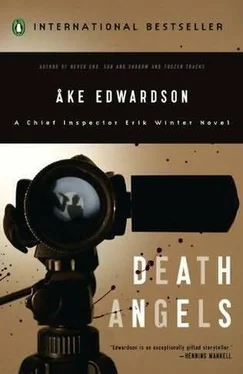COHEN:You’ve said that several times now.
BOLGER:A lot of good it does. The big boss over there in the corner doesn’t believe a word I say. With friends like him, who needs enemies?
COHEN:We found three passports in your apartment. They’re in the following names.
Bolger listened while Cohen recited the names.
COHEN:What do you know about those passports?
BOLGER:Nothing.
COHEN:Are you sure?
BOLGER:Somebody planted them.
COHEN:Who would put three passports in your apartment?
BOLGER:Chief Inspector Erik Winter, who else?
COHEN:You’re claiming that the assistant head of the homicide division of the county criminal investigation unit put passports in your apartment. Is that right?
BOLGER:He broke in, didn’t he? That’s against the law. Planting evidence, or whatever the hell you call it, is the logical next step.
COHEN:We have no knowledge of someone breaking into your apartment.
BOLGER:But I do.
COHEN:What were the passports used for?
BOLGER:Are you deaf or something? I have no idea.
They went on and on in the same vein. Winter studied Bolger from the side. His jowls were much heavier than when he was a kid. Something had drawn them to each other back then, and it had continued through the years. They had both remained bachelors, chosen not to have families-or families had chosen not to have them. Winter remembered Macdonald’s ponytail-clad kin. He had felt a pang of regret when he thought about the photo afterward. What did he have but the remnants of a family? If even that. When had he called his sister last?
Was Bolger plagued by the same regrets? Winter listened distractedly to the interrogation, the questions, the short answers, a couple that were a little longer. The voices came together in the middle of the room and he could no longer tell who was saying what.
Cohen ended the session, and Bolger followed the guards out without looking at Winter.
“I’d like to get a psychological profile of this guy,” Cohen said.
“I’ll arrange for one.”
MACDONALD CALLED AGAIN. HOUR AFTER HOUR, WINTER SATdeep in thought with his palms pressed against his forehead. Days had come and gone, bringing light and darkness and the whisper of a new kind of wind when he crossed Heden Park.
***
His phone jolted him out of his reverie.
“Publicizing those photos of Bolger may have yielded us some results,” Macdonald said. “For whatever it’s worth.”
“You said yesterday you’d never manage to sift through everything.”
“That was yesterday.”
“So what happened?”
“A couple called. They live near Christian’s hotel and say that they saw him sitting with a man outside a pub on Camberwell Grove.”
“Where’s that?”
“It’s that upscale street with Georgian architecture. I pointed it out to you when you were here. Our inspectors had knocked on all the doors in the neighborhood, but this couple was away at the time and we never had a chance to go back.”
“Okay.”
“They saw a black guy around twenty years old drinking beer with a tall blond man who could have been in his midthirties.”
“And they’re sure about that?”
“They’re sure it’s your high school buddy.”
“Don’t call him that.”
“What?”
“Please don’t use that expression.”
“Sorry. Anyway, the woman is positive. She watched them out of the corner of her eye when her boyfriend was inside the pub.”
“But all they’ve seen is a photo.”
“She also said she figured the kid was a foreigner because it’s so unusual to see a black person at that pub.”
“Local blacks are afraid to go there.”
“Right.”
“And she thinks it was Bolger?”
“Yes, but I’m going to reserve judgment until we can arrange a real lineup.”
“And suddenly they’ll all look the same to her.”
Silence at the other end of the line. The static was like fragments of Macdonald’s thoughts, crystallized in the emptiness of space.
“How’s the interrogation going?” Macdonald asked.
“He’s not talking. When he opens up a little, he claims he can’t remember. He’s had a lot to say about amnesia the past few days.”
“It’s not so unusual for a murder suspect to say he can’t remember.”
“I have my doubts. Deep down I know for sure, but I still have my doubts. Maybe it’s time for someone to take over the investigation who’s more capable. Or at least less emotionally involved.” He heard his own breathing in the receiver. “I’ve talked with Skogome, the forensic psychologist. He’s working on a profile of Bolger.”
“I have a lot of respect for those guys.”
“So do I.”
“As you know, people can feign amnesia to avoid confessing.”
“Yes.”
“Or it can be for real. That would make things a bit tougher for us, wouldn’t it? We’d find ourselves in unknown territory.”
Winter didn’t respond.
“Am I right, Erik?”
“He’s never going to confess under interrogation. I know what he’s like, and he’s simply not going to do that.”
“Are you sure?”
“I also know what his motive was.”
“What?”
“I’ll tell you as soon as I’ve thought through it, finished writing.”
“Writing?”
“My story.”
Macdonald waited, but Winter had nothing more to say. Macdonald was breathing heavily, and it sounded to Winter like he’d caught cold in the middle of the British spring.
“How are things with Frankie?” Winter asked.
“He’ll never let himself get drawn into something that endangers his own safety.”
“But what’s he looking for? Remember all that stuff he had to say about torture scenes?”
“I couldn’t tell you. He left a message for me this morning. I called back but he was out.”
“Maybe he’s found something.”
“Frankie? You never know.”
“Do you trust him?”
“Depends on what you mean by trust.”
“You know what I mean.”
“Frankie may be black, but his soul is white as snow.”
“Would he appreciate that comparison?”
“Of course not. Would you? I’ll call you right away if he comes up with anything you need to know.”
“Great.”
“Going back to Bolger’s memory problems-according to the statistics I’ve seen, 30 percent of the most violent criminals claim they can’t remember what happened.”
“The numbers are about the same here in Sweden.”
“We do lots of simulations, and it seems they have a naïve hope of holding on to their innocence.”
“Exactly.”
Winter knew that memory lapses needed to be taken seriously. If you wanted to get as close to the truth as possible, they had to be acknowledged and diagnosed. It was called dissociative amnesia. “But many offenders with amnesia have had mental problems at some point in their lives,” he said to Macdonald.
He had just spoken to an expert about it. Amnesia might be limited to the point at which the actual crime was committed. Or it could involve a personality change and loss of identity for several days. Or a split personality.
Winter had a moment of terror during their conversation. He had given the expert the photograph and handwritten material from Bolger’s apartment, and they’d discussed possible connections.
The expert explained that one cause of genuine amnesia was trauma or profound, emotionally charged conflict earlier in life.
Читать дальше












